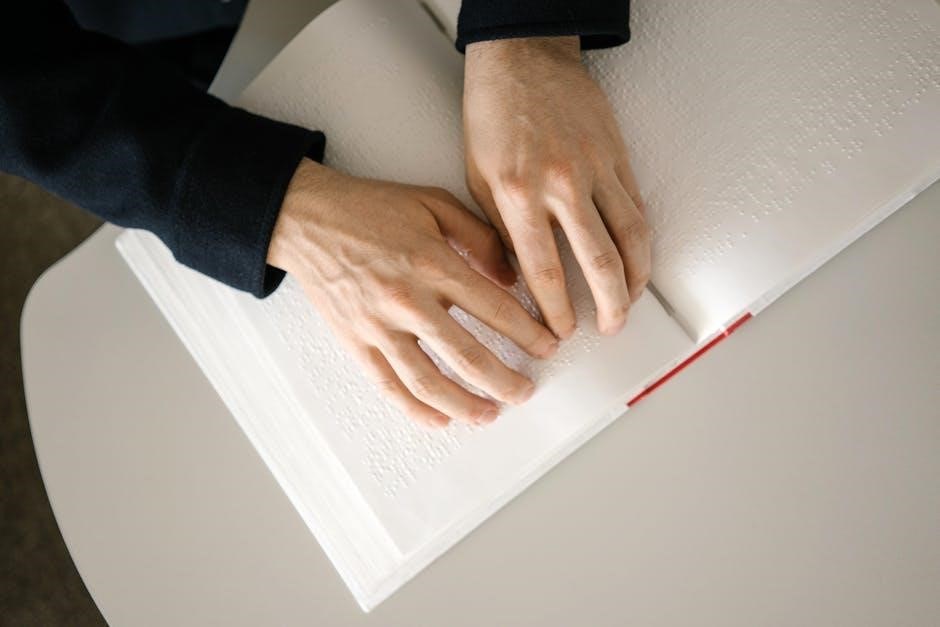envision math grade 5 workbook answer key pdf
Article Plan: Envision Math Grade 5 Workbook Answer Key PDF
This article details accessing the Envision Math Grade 5 workbook’s answer key PDF, covering resources, risks, and effective usage for student success․
Envision Math Grade 5 represents a pivotal stage in a student’s mathematical journey, building upon foundational concepts and introducing more complex ideas․ This curriculum, designed by Savvas Learning Co․ (formerly Pearson), emphasizes visual learning and real-world applications to foster deeper understanding․ The accompanying workbook serves as a core component, providing targeted practice and reinforcement of key skills․
However, mastering these concepts often requires additional support, which is where the Envision Math Grade 5 Workbook Answer Key PDF becomes invaluable․ It’s a crucial resource for students, parents, and educators alike, offering a means to verify understanding, identify areas needing improvement, and promote independent learning․ This article will comprehensively explore accessing and effectively utilizing this essential tool․
What is Envision Math?
Envision Math, a K-12 mathematics curriculum developed by Savvas Learning Co․, moves beyond rote memorization, encouraging students to “envision” – or visualize – mathematical concepts․ The program emphasizes problem-solving, critical thinking, and making connections between math and everyday life․ It utilizes a visually rich approach, incorporating models and representations to aid comprehension․
Unlike traditional methods, Envision Math focuses on building conceptual understanding before procedural fluency․ This approach aims to create a more robust and lasting grasp of mathematical principles․ The Grade 5 workbook specifically targets essential skills like fractions, decimals, volume, and early algebraic thinking, preparing students for future mathematical challenges․ Access to the corresponding Answer Key PDF is vital for reinforcing this learning․
The Importance of Answer Keys
Answer keys are indispensable tools for both students and educators utilizing the Envision Math Grade 5 workbook․ For students, they provide a means of self-assessment, allowing independent verification of solutions and identification of areas needing further review․ This fosters self-reliance and promotes a deeper understanding of concepts․
Teachers benefit from answer keys by streamlining grading processes and quickly pinpointing common student errors․ This enables targeted instruction and personalized support․ A readily available Envision Math Grade 5 Workbook Answer Key PDF facilitates efficient homework checks and practice reinforcement, ultimately maximizing learning outcomes and building confidence․

Understanding the Grade 5 Curriculum
Grade 5 mathematics builds upon foundational skills, introducing more complex concepts crucial for future success․ The Envision Math Grade 5 workbook aligns with this progression, covering essential topics like operations with fractions, decimal calculations, and the beginnings of algebraic thinking․ Students explore volume and area, applying mathematical reasoning to real-world problems․
A solid grasp of these concepts is vital, and the Envision Math Grade 5 Workbook Answer Key PDF serves as a valuable resource for navigating this curriculum․ Understanding the scope and sequence allows both students and educators to effectively utilize the workbook and ensure comprehensive learning․
Key Concepts in 5th Grade Math
Fifth-grade math fundamentally expands upon arithmetic, heavily emphasizing fractions and decimals – including operations like addition, subtraction, multiplication, and division with both․ Students begin to develop algebraic thinking, using variables to represent unknowns and solving simple equations․ Geometric understanding deepens with calculations of volume and area, applying formulas to practical scenarios․
The Envision Math Grade 5 Workbook Answer Key PDF is instrumental in mastering these key concepts․ It provides solutions and explanations, aiding comprehension and reinforcing skills․ Successfully navigating these topics sets a strong foundation for more advanced mathematical studies․
Common Core Standards Alignment
Envision Math Grade 5 is meticulously designed to align with the Common Core State Standards for Mathematics․ This ensures students develop critical thinking and problem-solving skills required for academic success․ The curriculum covers key domains like Operations and Algebraic Thinking, Number and Operations in Base Ten, Fractions, and Geometry․

The Envision Math Grade 5 Workbook Answer Key PDF supports this alignment by providing solutions that demonstrate mastery of each standard․ Educators and parents can utilize it to verify understanding and address learning gaps, ensuring students meet the rigorous expectations of the Common Core framework․
Locating the Envision Math Grade 5 Workbook Answer Key PDF

Finding the Envision Math Grade 5 Workbook Answer Key PDF requires careful navigation․ The official source is Savvas Learning (formerly Pearson), often requiring teacher credentials for access through their online platform․ Several third-party websites claim to offer the answer key, but caution is advised due to potential inaccuracies or security risks․
A direct search online may yield results, but verifying the source’s legitimacy is crucial․ Always prioritize official Savvas Learning resources to ensure the Envision Math Grade 5 solutions are accurate and aligned with the curriculum․
Official Savvas Learning Resources
Savvas Learning provides the most reliable access to the Envision Math Grade 5 Workbook Answer Key PDF․ Typically, educators with verified accounts can download the answer key directly from the Savvas Realize platform․ This platform requires registration and often school affiliation for authentication․
Access may also be granted through specific product purchases or subscriptions․ Savvas Learning’s official website offers detailed instructions and support for navigating their resources․ Prioritizing these official channels ensures accuracy and adherence to copyright regulations, safeguarding both students and educators․
Third-Party Websites Offering Answer Keys
Numerous websites claim to offer the Envision Math Grade 5 Workbook Answer Key PDF․ These range from dedicated educational resource sites to general file-sharing platforms․ While seemingly convenient, utilizing these sources carries significant risks․ The accuracy of answers isn’t guaranteed, potentially hindering learning and reinforcing incorrect concepts․
Furthermore, downloading from unofficial sites exposes users to potential malware, viruses, and copyright infringement issues․ Always exercise extreme caution and prioritize official Savvas Learning resources whenever possible to ensure a safe and reliable learning experience․
Potential Risks of Unofficial Sources
Accessing the Envision Math Grade 5 Workbook Answer Key PDF from unofficial sources presents several dangers․ Primarily, the accuracy of solutions is questionable, potentially leading to students learning incorrect methods and developing flawed understandings of core mathematical concepts․ Secondly, these websites often host malicious software, including viruses and malware, compromising device security․
Copyright infringement is another significant concern, as distributing copyrighted material without permission is illegal․ Prioritizing official Savvas Learning resources mitigates these risks, ensuring reliable, safe, and legally compliant access to the answer key․
Topics Covered in the Envision Math Grade 5 Workbook
The Envision Math Grade 5 Workbook comprehensively covers essential mathematical concepts․ Students will engage with operations with fractions, including addition, subtraction, multiplication, and division, alongside exploring decimal operations with similar rigor․ Further topics include detailed volume and area calculations for various geometric shapes, building a strong spatial reasoning foundation․
Importantly, the workbook introduces algebraic thinking, laying the groundwork for future math studies․ These topics are presented with visual aids and practice problems, designed to reinforce understanding and build confidence․
Operations with Fractions
Envision Math Grade 5 dedicates significant attention to operations with fractions․ Students learn to add and subtract fractions with both like and unlike denominators, mastering the concept of finding common denominators․ Multiplication and division of fractions are explored, often utilizing visual models to solidify understanding․
The workbook emphasizes simplifying fractions to their lowest terms and converting between improper fractions and mixed numbers․ Real-world problem-solving scenarios are integrated, allowing students to apply these skills practically․ The answer key provides step-by-step solutions for each problem, aiding comprehension․
Decimal Operations
Envision Math Grade 5 thoroughly covers decimal operations, building upon prior knowledge of place value․ Students practice adding, subtracting, multiplying, and dividing decimals, initially focusing on tenths and hundredths before progressing to more complex scenarios․ The workbook stresses aligning decimal points correctly during addition and subtraction․
Multiplication and division with decimals are presented with clear explanations and examples, often connecting to real-world contexts like money and measurement․ The answer key provides detailed solutions, demonstrating the proper procedures for each operation․ Understanding decimal equivalence is also reinforced throughout the lessons․
Volume and Area Calculations
Envision Math Grade 5 introduces students to calculating the volume of rectangular prisms with whole number side lengths, utilizing the formula Volume = length x width x height․ The workbook emphasizes understanding volume as the amount of space occupied by a three-dimensional object․ Area calculations extend beyond rectangles to include finding the area of composite figures․
Students learn to decompose complex shapes into simpler ones to determine the total area․ The answer key provides step-by-step solutions, illustrating how to apply the formulas and break down problems effectively․ Practical applications, like calculating the volume of a box or the area of a room, are frequently used;
Algebraic Thinking in Grade 5
Envision Math Grade 5 gently introduces algebraic concepts, moving beyond simple arithmetic․ Students begin to understand patterns and relationships, representing them with variables and simple equations․ The workbook focuses on using letters to stand for unknown numbers, fostering early algebraic reasoning skills․
Key topics include writing and evaluating expressions, and solving for unknowns in one-step equations․ The answer key is crucial for understanding the logic behind these steps, demonstrating how to isolate variables and maintain equation balance․ This foundational algebraic thinking prepares students for more complex concepts in later grades, building a strong mathematical base․
Using the Answer Key Effectively
The Envision Math Grade 5 answer key PDF isn’t simply for checking answers; it’s a powerful learning tool․ Students shouldn’t rely on it for immediate solutions, but rather to analyze how problems are solved․ Comparing their work to the key reveals errors in reasoning or calculation․
Parents and educators can use it to pinpoint specific areas where a student struggles․ Focusing on understanding the process, not just the final answer, is vital․ Encourage students to attempt problems independently first, then use the key to self-assess and improve their problem-solving strategies․
Checking Homework and Practice
The Envision Math Grade 5 workbook answer key PDF streamlines homework review․ Students can independently verify their solutions, fostering responsibility and self-reliance․ However, simply matching answers isn’t enough․ Encourage a detailed comparison of their work with the provided solutions, identifying any discrepancies in steps or logic․
Parents and teachers can efficiently assess understanding, focusing on areas needing reinforcement․ This allows for targeted support, addressing specific misconceptions․ Regular, thorough checks, utilizing the answer key, build confidence and solidify mathematical concepts, promoting long-term retention․
Identifying Areas of Weakness
Utilizing the Envision Math Grade 5 workbook answer key PDF reveals patterns in errors․ Consistent mistakes in specific topic areas – like fraction operations or volume calculations – pinpoint where a student struggles․ This isn’t about assigning blame, but about focused intervention․

Analyze why errors occur․ Is it a conceptual misunderstanding, a procedural mistake, or a careless error? The answer key facilitates this diagnostic process․ Targeted practice, revisiting foundational concepts, and seeking additional support can then address these weaknesses, building a stronger mathematical foundation for future success․
Supporting Independent Learning
The Envision Math Grade 5 workbook answer key PDF empowers students to take ownership of their learning․ It allows for self-checking, fostering a growth mindset and reducing reliance on constant teacher intervention․ Students can independently verify solutions, identify errors, and correct their work – crucial skills for academic success․
This self-directed approach builds confidence and encourages perseverance․ Rather than simply receiving answers, students actively engage with the material, strengthening their understanding․ The answer key becomes a tool for exploration and discovery, promoting a deeper, more meaningful grasp of mathematical concepts and problem-solving strategies․
Troubleshooting Common Issues with the PDF
Envision Math Grade 5 workbook answer key PDF users may encounter issues․ PDF reader compatibility is key; Adobe Acrobat Reader is generally recommended․ Download and saving problems can often be resolved by ensuring sufficient storage space and a stable internet connection․ Try a different browser or direct download․
Security concerns are valid․ Always scan downloaded PDFs with updated antivirus software before opening․ Corrupted files may require re-downloading from a trusted source․ If issues persist, consider accessing the answer key through official Savvas Learning resources or exploring alternative online support options․
PDF Reader Compatibility
Ensuring compatibility when accessing the Envision Math Grade 5 workbook answer key PDF is crucial for a smooth experience․ While most modern web browsers can open PDFs, Adobe Acrobat Reader remains the most reliable option․ It consistently renders complex mathematical notation and formatting accurately․

Older PDF readers might display errors or garbled text․ If encountering issues, update your current reader or download the latest version of Adobe Acrobat Reader․ Verify your browser’s PDF viewer settings are enabled․ Compatibility problems can also stem from a corrupted PDF file, necessitating a re-download․
Download and Saving Issues
Downloading the Envision Math Grade 5 workbook answer key PDF can sometimes present challenges․ Slow internet connections or server congestion on the provider’s end may interrupt the process․ Ensure a stable connection and retry the download․ Saving the file requires sufficient storage space on your device; check available capacity․
If the download completes but the file is corrupted, clear your browser’s cache and cookies before attempting another download․ Some browsers may block downloads; adjust security settings accordingly․ Always scan downloaded files with antivirus software before opening to prevent potential security risks․
Security Concerns and Virus Scans
Downloading the Envision Math Grade 5 answer key PDF from unofficial sources carries inherent security risks․ These sites may host malware disguised as legitimate files, potentially compromising your device and data․ Always prioritize downloading from official Savvas Learning resources to minimize these threats․

Regardless of the source, always perform a thorough virus scan on the downloaded PDF file before opening it․ Utilize reputable antivirus software and ensure it’s updated with the latest definitions․ Be cautious of suspicious file extensions or prompts during the download process․ Protecting your digital security is paramount when accessing educational materials online․
Envision Math and Envision Energy – Clarification
It’s crucial to distinguish between Envision Math, a Savvas Learning educational program, and Envision Energy , a Chinese company specializing in wind turbines and energy storage․ Online searches for “Envision” can yield results for both, causing confusion when seeking the Grade 5 workbook answer key PDF․
Envision Energy, while a legitimate global entity, is unrelated to the educational resources provided by Savvas․ When searching for the answer key, specifically include “Savvas Learning” or “Envision Math” to filter relevant results․ Avoid clicking links that lead to energy-related websites when your focus is solely on the math workbook’s solutions․
Distinguishing Between Educational Resources and the Company
The name “Envision” creates potential ambiguity, as it’s shared by both a prominent educational publisher’s math program and a global energy technology firm․ This overlap can complicate the search for the Envision Math Grade 5 workbook answer key PDF․ Users must carefully differentiate between resources from Savvas Learning – the source of the curriculum – and information pertaining to Envision Energy, the wind power company․
Always verify the website domain and content before downloading any answer key․ Look for “Savvas” or “Savvas Learning” in the URL to ensure you’re accessing legitimate educational materials, avoiding unrelated corporate websites․
Alternatives to the PDF Answer Key
While a PDF answer key is convenient, several alternatives support 5th-grade math learning․ Online tutoring resources offer personalized assistance, explaining concepts and checking work in real-time․ Numerous math help websites provide step-by-step solutions and practice problems, supplementing the workbook․

Collaborative learning with peers fosters understanding through discussion and shared problem-solving․ Students can explain their reasoning and learn from different approaches․ These options can be particularly valuable if PDF access is limited or problematic, offering diverse learning pathways beyond a static answer key․
Online Tutoring Resources
Numerous online platforms provide tailored math tutoring for 5th graders using Envision Math․ These resources connect students with qualified tutors for one-on-one sessions, addressing specific challenges and reinforcing concepts․ Services often offer interactive whiteboards, screen sharing, and personalized learning plans․
Benefits include flexible scheduling, focused attention, and immediate feedback․ Many platforms specialize in Common Core aligned math, ensuring relevance to the curriculum․ While typically subscription-based, online tutoring can be a highly effective alternative to solely relying on a PDF answer key, fostering deeper understanding and confidence;
Math Help Websites
Beyond tutoring, several websites offer free or low-cost math assistance, complementing the Envision Math Grade 5 workbook․ These platforms provide step-by-step solutions, video explanations, and practice exercises covering key 5th-grade topics like fractions, decimals, and geometry․ Khan Academy is a popular choice, offering comprehensive math content aligned with educational standards․
Other options include websites dedicated to specific math concepts or providing homework help forums․ While not a direct replacement for an answer key PDF, these resources empower students to independently explore solutions and build problem-solving skills, fostering a stronger grasp of mathematical principles․
Collaborative Learning with Peers
Studying with classmates can significantly enhance understanding of the Envision Math Grade 5 workbook material, offering an alternative to solely relying on an answer key PDF․ Group study sessions allow students to explain concepts to each other, identify areas of confusion, and learn different problem-solving approaches․
Working together fosters a supportive learning environment where students feel comfortable asking questions and sharing insights․ This collaborative process not only reinforces individual comprehension but also develops valuable communication and teamwork skills․ Peer learning complements independent study and provides a dynamic way to master 5th-grade math concepts․

Copyright and Legal Considerations
Accessing and utilizing the Envision Math Grade 5 workbook answer key PDF requires awareness of copyright laws and intellectual property rights․ Savvas Learning, the publisher, holds exclusive rights to the workbook and its associated materials, including answer keys․ Unauthorized distribution or reproduction of these materials is a violation of copyright․
While using the answer key for personal study and homework help is generally acceptable, sharing it widely or posting it online is prohibited․ Respecting intellectual property ensures the continued availability of quality educational resources and supports the work of the creators․ Fair use principles apply, but primarily for educational purposes, not for commercial gain․
Fair Use of Answer Keys
The concept of “fair use” allows limited use of copyrighted material, like the Envision Math Grade 5 answer key PDF, without permission from Savvas Learning․ This typically applies to educational purposes, such as teachers using the key to prepare lessons or students checking their work․ However, fair use isn’t unlimited․
Simply possessing the key isn’t illegal, but distributing it widely – posting online, selling copies – violates copyright․ Utilizing the key to understand concepts is acceptable; relying on it to simply copy answers hinders learning․ Fair use prioritizes transformative use, adding value through education, not replacing independent problem-solving․
Respecting Intellectual Property
The Envision Math Grade 5 workbook and its accompanying answer key PDF are protected by copyright law, representing Savvas Learning’s intellectual property․ This means unauthorized reproduction, distribution, or modification is illegal and unethical․ Purchasing the workbook grants a license for individual or classroom use, not the right to freely share the answer key․
Respecting this intellectual property encourages continued investment in quality educational resources․ Utilizing legally obtained materials supports the creators and ensures future updates and improvements․ Seeking legitimate access, rather than relying on unofficial sources, upholds academic integrity and promotes responsible learning practices for students․
Future of Envision Math Resources
The future of Envision Math resources, including the Grade 5 workbook and answer key, is likely to lean heavily into digital learning trends․ Expect increased integration of online platforms, interactive exercises, and personalized learning paths․ Savvas Learning may shift towards subscription-based access models, offering dynamic answer keys updated in real-time alongside evolving curriculum standards․
Accessibility will likely improve, with resources optimized for various devices․ Updates to answer key availability could include enhanced security features and more robust protection against unauthorized sharing․ Continued development will focus on aligning with Common Core and fostering algebraic thinking skills․
Digital Learning Trends
Current digital learning trends significantly impact how students access and utilize resources like the Envision Math Grade 5 workbook answer key PDF․ Increased reliance on online platforms, interactive simulations, and gamified learning experiences are reshaping education․ Personalized learning, driven by data analytics, allows for tailored practice and targeted support․
The demand for readily available digital answer keys reflects a broader shift towards self-paced learning and independent study․ Cloud-based solutions and mobile accessibility are becoming standard, enabling students to learn anytime, anywhere․ These trends necessitate secure, user-friendly digital resources․
Potential Updates to Answer Key Availability
Savvas Learning, the publisher of Envision Math, may periodically update the availability and format of the Grade 5 workbook answer key PDF․ These changes often align with curriculum revisions or platform enhancements․ Expect potential shifts towards subscription-based access, integrated digital platforms, or enhanced security measures to protect intellectual property․
Future updates could include interactive answer keys with step-by-step solutions or video explanations․ The company might also consolidate resources onto a single, unified digital learning environment․ Staying informed about official announcements from Savvas Learning is crucial for consistent access․
Effectively utilizing the Envision Math Grade 5 workbook, alongside its answer key PDF, empowers students to build a strong mathematical foundation․ Responsible answer key use – for checking work, identifying weaknesses, and fostering independent learning – is paramount․ Remember to prioritize understanding concepts over simply obtaining correct answers․

Staying aware of official resources and potential updates from Savvas Learning ensures access to the most current and reliable support․ Combining the workbook with supplemental tools like online tutoring and peer collaboration maximizes learning potential and cultivates confidence in mathematical abilities․


























































































